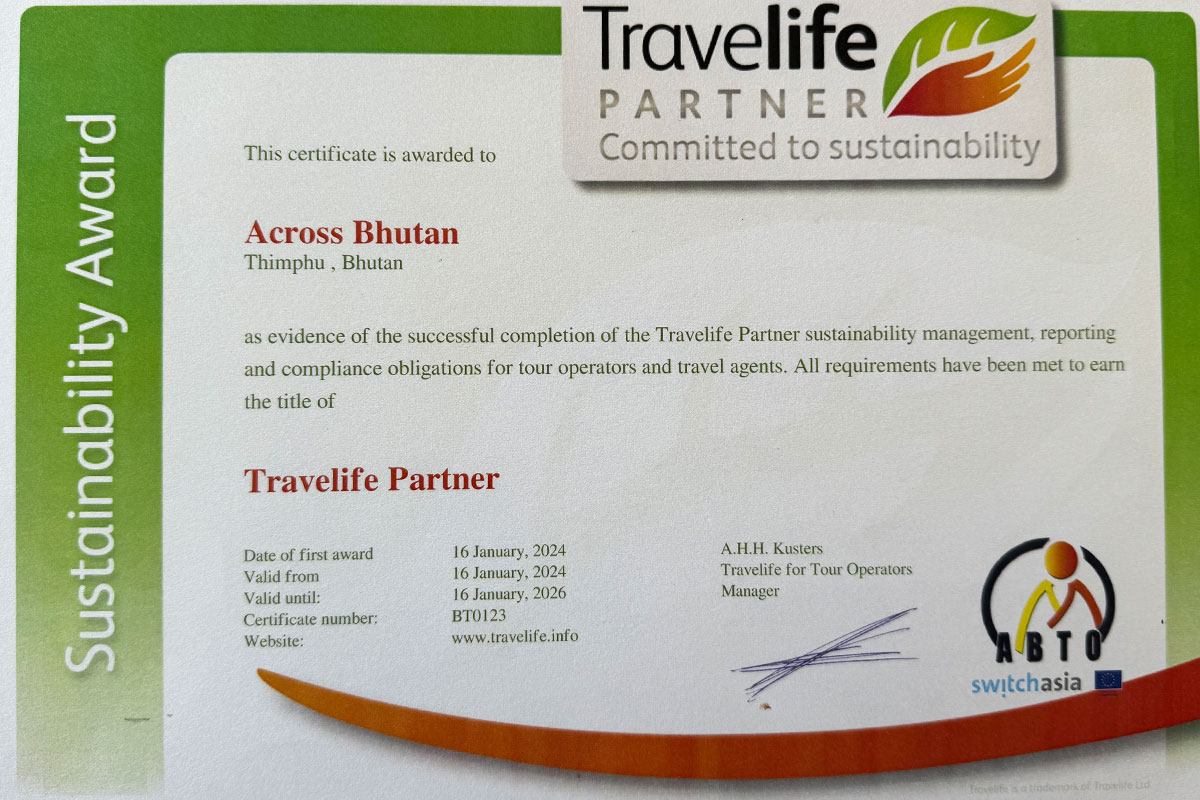First and foremost, we extend our heartfelt gratitude to Travelife for their invaluable support in providing us with training and opportunities to enhance our understanding and expertise in sustainable tourism practices. Their commitment to fostering sustainable tourism aligns perfectly with our own aspirations, and we are truly grateful for the guidance and resources they have provided. Through their training programs and initiatives, we have gained valuable insights and skills that enable us to make meaningful contributions towards the preservation of our environment, culture, and communities. We look forward to continuing our partnership with Travelife as we strive to further integrate sustainability principles into our operations and enhance the experiences of our guests in a responsible and ethical manner.
Bhutan has gained international recognition for its commitment to sustainable tourism through its policy of "high-value, low-impact" tourism. This approach is rooted in Bhutan's Gross National Happiness (GNH) philosophy, which prioritizes holistic well-being over economic growth alone.
Key features of sustainable tourism in Bhutan include
Environmental conservation
Bhutan places great emphasis on protecting its pristine environment. Strict regulations are in place to limit the number of tourists and preserve fragile ecosystems. Initiatives such as carbon-neutral policies, forest conservation, and wildlife protection contribute to minimizing environmental degradation.
Cultural preservation
Bhutan has a rich cultural heritage, including its distinctive architecture, traditions, and festivals. Sustainable tourism aims to respect and preserve these cultural assets by promoting authentic experiences, supporting local artisans and craftsmen, and encouraging cultural exchange in a respectful manner.
Community involvement
Sustainable tourism initiatives in Bhutan prioritize the participation of local communities in decision-making processes and the equitable distribution of tourism benefits. Community-based tourism projects empower rural communities to directly benefit from tourism while preserving their way of life and traditional livelihoods.
Responsible tourism practices
Tour operators in Bhutan are required to adhere to strict guidelines to ensure responsible and ethical conduct. These include minimizing waste generation, promoting energy efficiency, respecting local customs and traditions, and providing opportunities for tourists to engage with and learn from local communities.
Tourism revenue for social development
A portion of the revenue generated from tourism in Bhutan is allocated to social welfare programs, including healthcare, education, and infrastructure development, contributing to poverty alleviation and improving the overall well-being of Bhutanese citizens.
Across Bhutan is deeply appreciative and elated to contribute to the realm of sustainable tourism within Bhutan. Committed to exemplifying a harmonious equilibrium between economic advancement and the preservation of the environment and cultural heritage, Across Bhutan aspires to serve as a beacon of inspiration. By showcasing the potential of tourism as a catalyst for sustainable development, the organization endeavors to underscore the significance of responsible management aligned with the intrinsic values and priorities of the local community.
